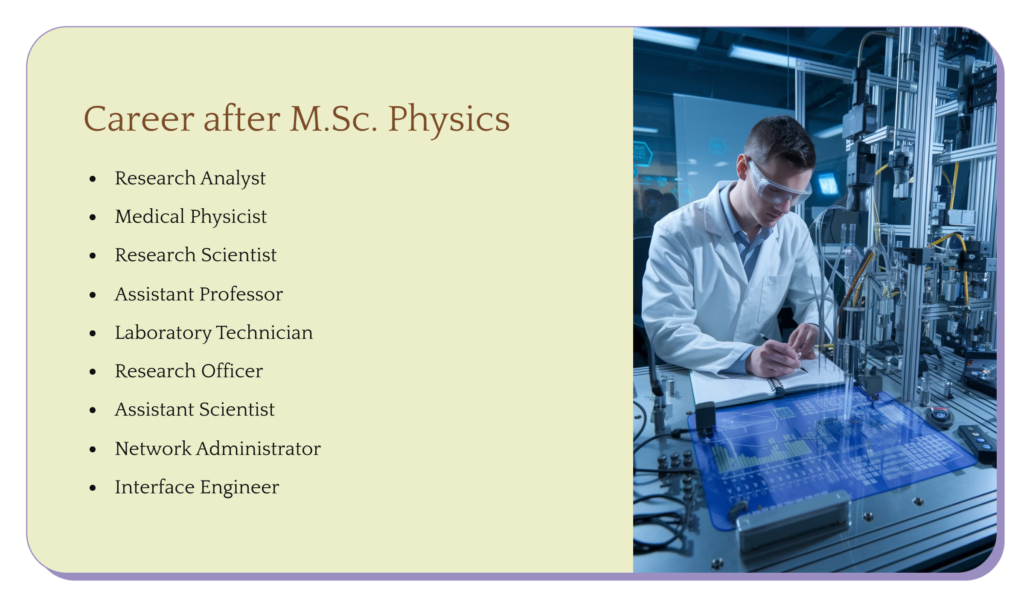

Quick Summary

The career after M.Sc. Physics is vast and offers a wide range of opportunities. This course equips students with theoretical and practical knowledge, opening doors to various fields such as medical, nuclear, private, and government sectors. With the right skills, M.Sc. Physics graduates can enter several industries that value their scientific expertise.
If you’re wondering about the career after M.Sc. Physics, you will be pleased to know that it offers diverse pathways. Many students specialize in a specific field, such as research, teaching, or working in physics-related industries. When considering a career after M.Sc. Physics, many students wonder which courses can lead to high-paying jobs. Numerous specialized courses are available, including those in data science, artificial intelligence, or advanced physics.
This article will explore the various career paths and courses after M.Sc. Physics that can help students secure rewarding positions. Whether you want to enter research, work in private companies, or pursue a role in the government, there are numerous options available. Understanding the right courses after M.Sc. Physics can help you make informed decisions and pave the way for a successful career.
Related Read: BSc Physics- Course Details and Salary
Choosing the right courses after M.Sc. Physics can deepen your expertise and expand your career prospects. These courses will equip you with the skills needed to work in various fields, helping you make the most of your academic background and opening doors to exciting career paths.
Related Article: How to apply for a PhD- Complete Guide
If you wish to delve deeper into the scientific subject matter and make a promising career after M.Sc. Physics, you can pursue a PhD in Applied Physics. Applied Physics deals with the study of the applicability of the technology in physics. You will be researching Ferroelectrics, Photonics, Carbon nanotubes, Photonic crystals, Metamaterials, Plasmonic Solar cells, etc.
A career after M.Sc. Physics also includes biophysics, which uses physical science to study biological systems. You can be a research fellow in biochemistry, nanotechnology, bioengineering, agro-physics, systems biology, etc.
One of the options in career after M.Sc. Physics is pursuing a PhD in Chemical Thermodynamics. This specialized field focuses on studying heat and energy changes during chemical reactions. By delving into this area, you can gain advanced knowledge and skills that open up numerous research and academic opportunities. Graduates with expertise in this field can contribute to developing new technologies and processes, making this an exciting option for those interested in theoretical and applied physics. The career after M.Sc. Physics in this area is diverse and rewarding.
A PhD in nuclear physics is an excellent career choice after an MSc in physics. Nuclear Physics deals with studying the building blocks and interactions of atomic nuclei. Research areas include nuclear force, nuclear power, astrophysics, archaeological dating, and fundamental symmetries.
You can pursue a Ph.D. after completing a B.Sc. Physics and M.Sc. Physics is a field that studies matter physics, quantum optics, laser physics, solid-state physics, materials science, electronic science, high-energy physics, and non-linear optics.
A career after M.Sc. Physics offers opportunities in advanced fields like magnetism, semiconductors, nanostructures, and quantum computing. Research in thin films, liquid crystals, and quantum optics drives innovations in energy, AI, and secure communication. These fields provide career prospects in academia, R&D, and cutting-edge technology industries.

A career after M.Sc. Physics opens the door to high-end job opportunities in reputed industries, offering impressive salary packages. These industries value the advanced skills and knowledge gained during the course, making graduates highly sought after in various sectors. With a solid theoretical and practical physics foundation, you can explore roles that align with your interests and expertise.
The career after M.Sc. Physics is diverse, with opportunities in research, technology, and industry-specific roles. Graduates can find rewarding positions in sectors like healthcare, energy, and advanced materials, where their skills are in demand. The potential for growth and lucrative salaries make a career after M.Sc. Physics fulfilling and financially rewarding.

One of the most prominent jobs after completing an MSc in physics is a research analyst. A research analyst interprets and presents data on an organization’s marketing conditions and work operations.
Average Salary: A research analyst earns an average salary of around INR 4.9 Lakhs per annum.
A Medical physicist works in the healthcare sector and implements their knowledge of Physics in developing and utilizing medical treatment radiation, technology, and devices.
Average Salary: The average salary of a medical physicist is INR 7.3 Lakhs per annum.
Another exciting career option after M.Sc. Physics is a Research Scientist. A research scientist analyzes information and creates designs for controlled laboratory-based investigations, trials, and experiments. Research Scientist jobs are very well respected among other MSc physics jobs.
Average Salary: An average salary of INR 8.71 Lakhs per annum is earned by a research scientist.
An Assistant Professor teaches specialization subjects to students at various educational institutions or universities. They also create educational assignments and project work for students and analyze their knowledge.
Average Salary: An assistant professor can earn an average INR 5.6 Lakhs per annum.
A Laboratory Technician is responsible for maintaining all the aspects of laboratory work, including recording data and maintaining equipment.
Average Salary: The average salary of a laboratory technician is around INR 2.40 Lakhs per annum.
Research officer is an enhancing career after M.Sc. Physics. A research officer is responsible for supervising research projects to accomplish specific objectives. This is one of the most reputed MSc Physics jobs. Average Salary: A research officer earns an average INR 4 Lakhs per annum.
An Assistant scientist provides support to scientists in research and educational subject matter. They are also responsible for maintaining laboratory equipment and supplying inventory records.
Average Salary: The average salary of an assistant scientist ranges around INR 5.6 Lakhs per annum.
The career after M.Sc. Physics also includes technology. A network administrator manages an organization’s day-to-day operations by organizing, installing, and supporting network systems.
Average Salary: The average salary of a network administrator is INR 5.7 Lakhs per annum.
An Interface Engineer manages the software development life cycle, interface engine workflow, raw clinical data, and data transformation. It is also considered as one of the best career after M.Sc. Physics.
Average Salary: An interface engineer earns an average INR 7.5 Lakhs per annum.
A career after M.Sc. Physics demands technical expertise and soft skills to excel in research, industry, and academia.
To stay competitive in physics, continuous learning and upskilling are essential.
Developing technical and soft skills and relevant certifications ensures a strong foundation for a successful career after M.Sc. Physics, whether in research, industry, or higher studies.
The field of physics is evolving rapidly, creating new opportunities for those pursuing a career after M.Sc. Physics. Advancements in AI, computational physics, and interdisciplinary applications shape future job roles across industries.
Staying updated with these evolving trends will help physics graduates build a successful and future-ready career after M.Sc. Physics.
A career after M.Sc. Physics offers opportunities with top recruiters across various industries. These organizations value the expertise and skills of physics postgraduates, offering roles in research, development, and technical domains. With the demand for physics graduates rising, many reputed companies actively seek candidates who can contribute to innovative projects and advancements.
An M.Sc. in Physics opens doors to diverse career opportunities across industries like healthcare, IT, research and development (R&D), energy, and manufacturing. Graduates can work in corporate and research-based roles, which offer unique challenges and growth prospects.

An M.Sc. Physics equips graduates with analytical and problem-solving skills, making them valuable assets in energy, healthcare, IT, research & development, and manufacturing industries. Leading global and national organizations actively seek physics postgraduates for roles in innovation, research, and technological advancements.
With continuous growth in technology-driven sectors, physics postgraduates can build rewarding career after M.Sc Physics by leveraging their Python, MATLAB, and specialized equipment expertise.

Physics postgraduates have excellent opportunities to work with esteemed government organizations. These institutions focus on research, development, and innovation, offering roles that allow professionals to contribute to significant advancements in science and technology. Positions in these organizations are highly respected and provide a platform to work on impactful space exploration, energy, and defense projects.
Working in government organizations ensures job stability, competitive benefits, and opportunities for career growth. Professionals can engage in meaningful work that drives societal progress and national development. These roles also allow individuals to collaborate with experts, utilize state-of-the-art facilities, and contribute to projects of national and international importance, making it an enriching career path. Some of these government organizations are mentioned below:-
M.Sc. Physics graduates have numerous opportunities to enhance their careers by choosing specialized courses and exploring diverse fields. The availability of various classes after M.Sc. Physics allows students to deepen their expertise and gain valuable skills. These courses can significantly boost their profiles, paving the way for successful and rewarding career paths.
A career after M.Sc. Physics presents numerous opportunities in both the private and government sectors. Graduates can explore roles in research, technology, and advanced industries where their analytical and problem-solving skills are highly valued. Industries such as IT, healthcare, and energy actively seek physics postgraduates for innovative projects. Pursuing specialized courses and certifications further enhances career prospects, enabling graduates to secure positions in reputed organizations, contribute to scientific advancements, and achieve long-term professional growth in their chosen field.
Additionally, career after M.Sc. Physics offers lucrative salary packages, reflecting the demand for skilled professionals. By choosing specialized courses after M.Sc. Physics students can align their career goals with industry needs, unlocking opportunities in cutting-edge areas. With the proper preparation, M.Sc. Physics graduates can achieve great heights in their chosen careers while continuing to learn and grow.
M.Sc in physics is worth doing if you’re passionate about the subject and seek a career in research, academia, or specialized fields. It offers in-depth knowledge and critical thinking skills, and opens doors to advanced opportunities, though it’s a significant time and financial commitment.
Numerous career opportunities are available for students with a master’s degree in physics. Some jobs after an MSc in physics are research scientist, medical physicist, research analyst, laboratory technician, and more. The average salary of an MSc physics graduate is around INR 9 lakhs per annum.
M.Sc courses like thermodynamics, nuclear physics, particle physics, geophysics, biophysics, classical mechanics, quantum mechanics, astrophysics, optics, and atomic and molecular physics are some of the best courses in physics. Nuclear physics & astrophysics are the best branches of MSc physics.
Yes, you can join ISRO after MSc Physics. ISRO recruits scientists and engineers with the best degrees in physics for various roles, including research and development. Check their official website for specific eligibility criteria and job openings.
Yes, you can join DRDO with an MSc in Physics. DRDO hires candidates with advanced degrees for research, development, and technical project roles. Ensure you meet the specific qualifications.

Authored by, Amay Mathur | Senior Editor




Amay Mathur is a business news reporter at Chegg.com. He previously worked for PCMag, Business Insider, The Messenger, and ZDNET as a reporter and copyeditor. His areas of coverage encompass tech, business, strategy, finance, and even space. He is a Columbia University graduate.
Editor's Recommendations
Chegg India does not ask for money to offer any opportunity with the company. We request you to be vigilant before sharing your personal and financial information with any third party. Beware of fraudulent activities claiming affiliation with our company and promising monetary rewards or benefits. Chegg India shall not be responsible for any losses resulting from such activities.
Chegg India does not ask for money to offer any opportunity with the company. We request you to be vigilant before sharing your personal and financial information with any third party. Beware of fraudulent activities claiming affiliation with our company and promising monetary rewards or benefits. Chegg India shall not be responsible for any losses resulting from such activities.